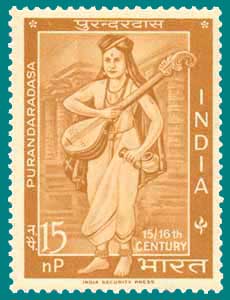
Purandara Dasa was a composer, singer and a Haridasa philosopher from present-day Karnataka, India. He was a follower of Madhvacharya's Dvaita philosophy. He was one of the chief founding proponents of Carnatic music. In honor of his contributions to Carnatic music, he is referred to as the Pitamaha of Carnatic music. According to a legend, he is considered as an incarnation of Narada.

Kanaka Dasa (1509–1606) was a Haridasa saint and philosopher of Dvaita Vedanta, also known as Daasashreshta Kanakadasa from present-day Karnataka, India. He was a follower of Madhvacharya's Dvaita philosophy and a disciple of Vyasatirtha. He was a composer of Carnatic music, poet, reformer and musician. He is known for his keertanas and ugabhoga, and his compositions in the Kannada language for Carnatic music. Like other Haridasas, he used simple Kannada and native metrical forms for his compositions.

Sri Vadiraja Tirtha was a Dvaita philosopher, poet, traveller and mystic. He authored many works, often critical, on Madhva theology and metaphysics. Additionally, he composed numerous poems and as the pontiff of Sodhe Mutt, renovated the temple complex at Udupi and established the Paryaya system of worship. He also enriched the Kannada literature of the time by translating Madhvacharya's works to Kannada, giving impetus and contributing to the Haridasa movement. He has influenced both Carnatic and Hindustani music through his compositions. His compositions are mainly in Kannada and Sanskrit. His mudra is 'Hayavadana'. His works are characterised by their poetic flourishes, wit and humour.

The Haridasa Bhakti Sahitya devotional movement (sampradaya) originated in Karnataka, India, after Madhvacharya, and spread to eastern states such as Bengal and Assam of medieval India. Over a span of nearly six centuries, several saints and mystics helped shape the culture, philosophy and art of South India in general and Karnataka in particular by exerting considerable spiritual influence over the masses and kingdoms that ruled South India.

Bannanje Govindacharya was an Indian philosopher and Sanskrit scholar versed in Veda Bhashya, Upanishad Bhashya, Mahabharata, Puranas and Ramayana. He wrote Bhashyas (commentaries) on Veda Suktas, Upanishads, Shata Rudriya, Brahma Sutra Bhashya, Gita Bhashya and was an orator. He was awarded the Padma Shri by the Government of India in 2009.
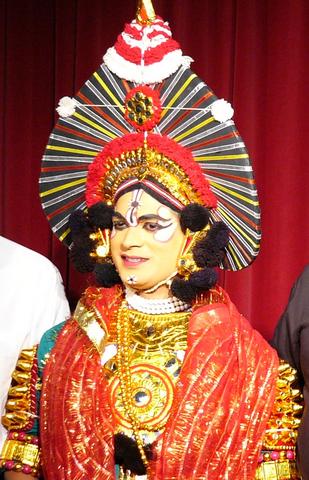
Karnataka, a southern state in India, has a distinct art style and culture informed by a long history of diverse linguistic and religious ethnicities. Apart from Kannadigas, Karnataka is home to Tuluvas, who also consider themselves as Kannadigas. Minor populations of Tibetan Buddhists, Siddhi tribes, and a few other ethnic groups also live in Karnataka. The traditional folk arts are major theatrical forms in coastal Karnataka. Contemporary theatre culture in Karnataka is one of the most vibrant in India, with organizations like Ninasam, Ranga Shankara, and Rangayana on foundations laid by the Gubbi Veeranna Nataka Company. Veeragase, Kamsale, and Dollu Kunitha are popular dance forms. Bharatanatya also enjoys wide patronage in Karnataka.

Vijaya Dasa was a prominent saint from the Haridasa tradition of Karnataka, India in the 18th century, and a scholar of the Dvaita philosophical tradition. Along with contemporary haridasa saints such as Gopala Dasa, Helevankatte Giriamma, Jagannatha Dasa and Prasanna Venkata Dasa, he propagated the virtues of the philosophy of Madhwacharya across South India through devotional songs called devaranama written in the Kannada language. An integral part of Kannada Vaishnava devotional literature, these compositions in praise of the Hindu god Vishnu as well as other deities are called dasara padagalu. He has influenced both Carnatic music and Hindustani music through his compositions. His ankita is Vijaya vithala. These compositions can be more specifically categorized as keertanas, suladis, ugabhogas, and simply padas. They were easy to sing to the accompaniment of a musical instrument and dealt with bhakti (devotion) and the virtues of a pious life.
Medieval Kannada literature covered a wide range of subjects and genres which can broadly be classified under the Jain, Virashaiva, Vaishnava and secular traditions. These include writings from the 7th century rise of the Badami Chalukya empire to the 16th century, coinciding with the decline of Vijayanagara Empire. The earliest known literary works until about the 12th century CE were mostly authored by the Jainas along with a few works by Virashaivas and Brahmins and hence this period is called the age of Jain literature,. The 13th century CE, to the 15th century CE, saw the emergence of numerous Virashaiva and Brahminical writers with a proportional decline in Jain literary works. Thereafter, Virashaiva and Brahmin writers have dominated the Kannada literary tradition. Some of the earliest metres used by Jain writers prior to 9th century include the chattana, bedande and the melvadu metres, writings in which have not been discovered but are known from references made to them in later centuries. Popular metres from the 9th century onwards when Kannada literature is available are the champu-kavyas or just champu, vachanasangatya, shatpadi, ragale, tripadi, and kavya.

Vijayanagara literature in Kannada is the body of literature composed in the Kannada language of South India during the ascendancy of the Vijayanagara Empire which lasted from the 14th through the 16th century. The Vijayanagara empire was established in 1336 by Harihara I and his brother Bukka Raya I. Although it lasted until 1664, its power declined after a major military defeat by the Shahi Sultanates in the battle of Talikota in 1565. The empire is named after its capital city Vijayanagara, whose ruins surround modern Hampi, now a World Heritage Site in Karnataka.

Vidyabhushana is a vocalist from Karnataka. He sings devotional songs, chiefly Haridasa compositions, and carnatic classical music. He has many albums to his credit, mainly devotional songs in Kannada, Tulu and has given concerts all over the world. His first album was titled "Dasara Padagalu" and the 100th titled "Tanu Ninnadu Jivana Ninnadu". Performing for more than 40 years, he has traveled to many countries including a tour across the United States in 1999., He was honoured with the title of Sangeetha Vidya Nidhi in 1994. He was also honoured the Doctorate by Hampi University.
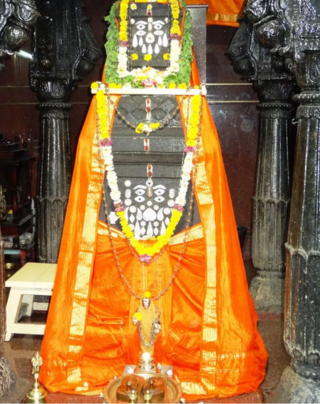
Jagannatha Dasa (1728–1809), a native of Manvi town in the Raichur district, Karnataka state, India, comes in the preceptorial line of Madhvacharya and is considered one of the notable Haridasa of Dvaita Vedanta of Madhva saint-poets of the Kannada language. He was a pupil of the great Sri Varadendra Tirtha.
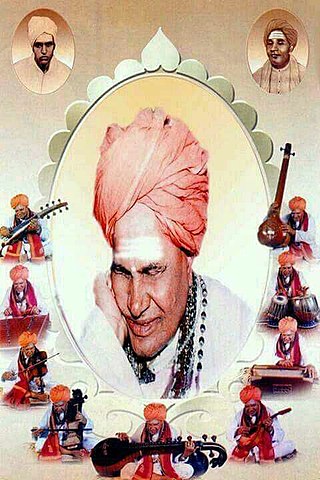
PanditPuttaraj Gawayigalu was an Indian musician in the Hindustani classical tradition, a scholar who authored more than 80 books in Kannada, Sanskrit and Hindi, a music teacher and a social servant. A member of the Gwalior Gharana (school), he is renowned for his ability to play many instruments such as the veena, the tabla, mridangam, violin etc., as well as for his popular renditions of devotional music (bhajans) vachanas.A famous vocalist both in Hindustani and Carnatic Music. He is the recipient of the Padma Bhushan, India's third highest civilian honour, awarded in 2010.

K. V. Krishna Prasad, also known as KP, is a Carnatic music vocalist.

Hinduism is the most followed Religion in India and nearly 84% of the total population of Karnataka follows Hinduism, as per 2011 Census of India. Several great empires and dynasties have ruled over Karnataka and many of them have contributed richly to the growth of Hinduism, its temple culture and social development. These developments have reinforced the "Householder tradition", which is of disciplined domesticity, though the saints who propagated Hinduism in the state and in the country were themselves ascetics. The Bhakti movement, of Hindu origin, is devoted to the worship of Shiva and Vishnu; it had a telling impact on the sociocultural ethos of Karnataka from the 12th century onwards.
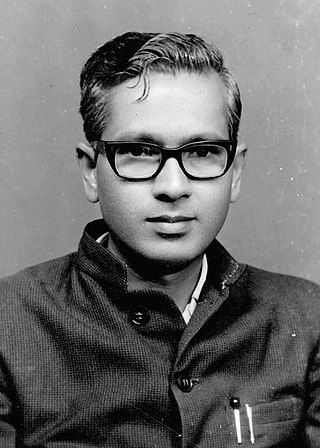
Togere Venkatasubbasastry Venkatachala Sastry, commonly known as T. V. Venkatachala Shastry, is a Kannada-language writer, grammarian, critic, editor and lexicographer. He has authored in excess of 100 books, translations and has edited collections of essays, biographical sketches and felicitation volumes. Recipient of the Kannada Sahitya Akademi Award (honorary), Sastry is an authority on Kannada language grammar and its various facets ranging from the metre scale on which he has written extensively to the history of Kannada literature spanning two millennia.

Madhva Brahmins, are Hindu Brahmin communities in India, who follow Sadh Vaishnavism and Dvaita philosophy propounded by Madhvacharya. They are found mostly in the Indian states of Karnataka, Maharashtra, Goa, Tamil Nadu, Kerala, Telangana and Andhra Pradesh.

Aryamba Pattabhi is an Indian novelist and writer in Kannada language. She is the younger sister of Triveni, a popular Kannada novelist and the niece of B. M. Srikantaiah, a famous Kannada poet, writer and translator.

Sri Purandaradasa Aradhana is the annual aradhana of Kannada saint composer Purandara Dasa, who is considered as "The Pitamaha" of Carnatic Music. The festival is observed in the states of Andhra Pradesh and Karnataka, primarily in Hampi, the place where Purandara Dasa lived and attained Samadhi The aradhana is observed on Pushya Bahula Amavasya day, when the saint attained samadhi.

Venkataramaiah Seetharamaiah commonly known as Vee See, was a Kannada poet, writer, essayist, critic, editor and teacher who taught Kannada literature at University of Mysore between 1928 and 1955. He is a recipient of the Karnataka Sahitya Akademi Award (1973), Kendra Sahitya Akademi Award and an Honorary Doctorate from University of Mysore in 1976. He presided over the 36th Kannada Sahitya Sammelana at Kumta in 1954.
















